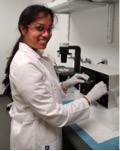Chelsie Boodoo
Chelsie’s research investigates how factors such as hyperhomocysteine, folic acid, biomechanics and palmitate that activate IRE1 affect the extacellular matrix in relation to spina bifida.
 Research
Research
Maternal diabetes or improper vitamin supplementation during pregnancy can lead to neural tube defects like spina bifida. Folate deficiency leads to hyperhomocysteine which has been associated with neural tube defects. In diabetic mothers, their serum levels of free fatty acids, like palmitate, and homocysteine levels are elevated. Palmitate, a saturated free fatty acid, can induce the dimerization of Inositol Requiring Enzyme (IRE1), which is an ER transmembrane sensor of the unfolded protein response. Chelsie’s research investigates how factors such as hyperhomocysteine, folic acid, biomechanics and palmitate that activate IRE1 affect the extacellular matrix in relation to spina bifida.
Awards
- MSU Engineering Symposium
- 1st Place Best Poster Presentation in Health, Food Safety and Biomechanics for research on how mechanics affect the extracellular matrix of the bladder
- MSU Student Life and Services Awards
- Gold Recipient MSU 2020 Graduate Student Leader
Outreach Project
Chelsie helped organize a series of science-art events at MSU through MSU SciComm, an organization that she founded and leads.



 Print
Print Email
Email

